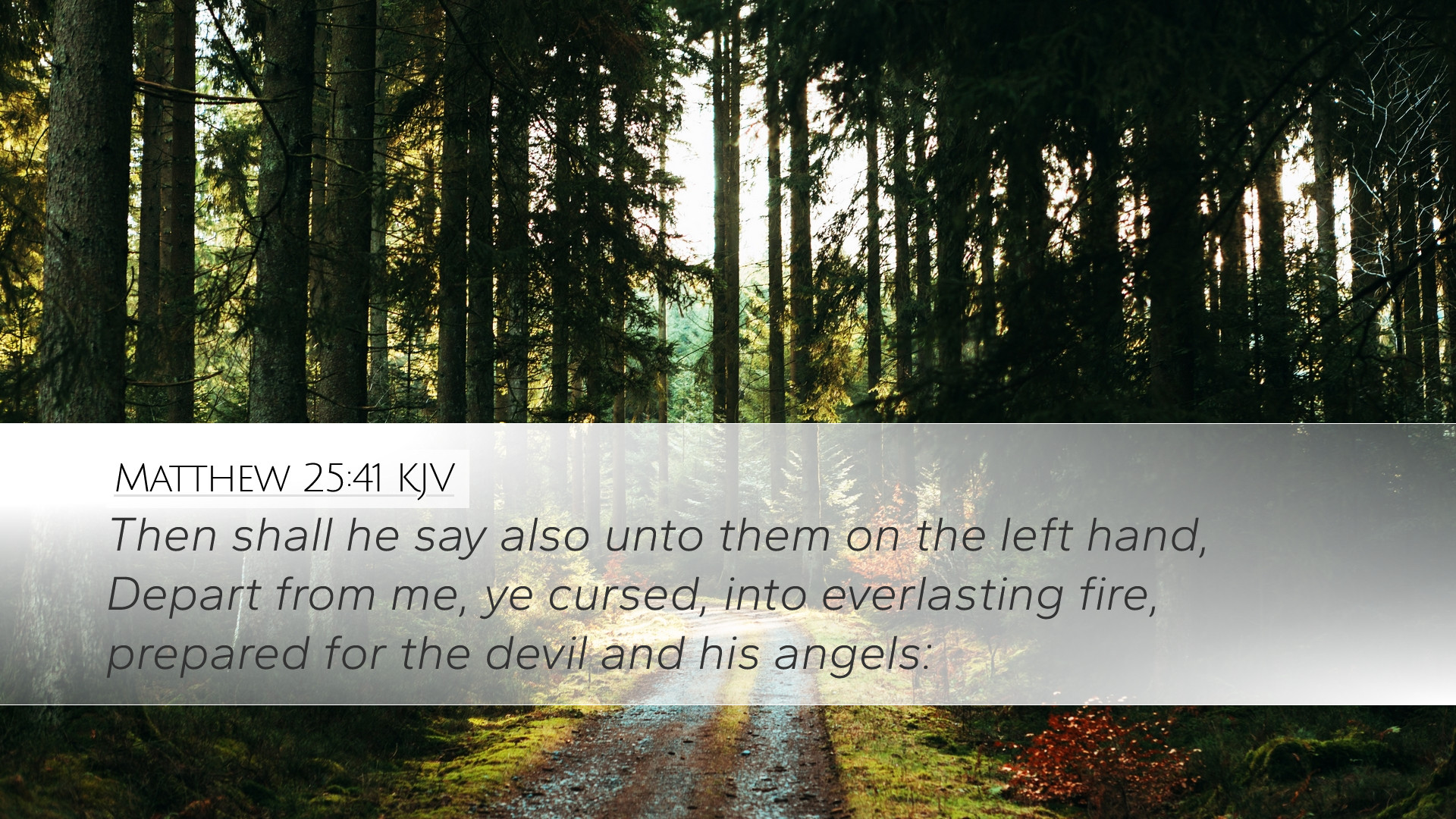Commentary on Matthew 25:41
Matthew 25:41 (KJV): "Then shall he say also unto them on the left hand, Depart from me, ye cursed, into everlasting fire, prepared for the devil and his angels."
Introduction
This verse is part of the parable of the sheep and the goats, where Jesus illustrates the final judgment. The distinction between the righteous and the unrighteous is made, highlighting the ultimate fate awaiting those who do not follow Christ. The imagery of 'everlasting fire' and the reality of hell are significant theological themes that demand careful and respectful exposition.
The Context of the Judgment
In the context of Matthew 25, Jesus presents a vivid picture of His return and the separation that will occur among humanity. Albert Barnes remarks that this judgment scene emphasizes the absolute moral authority of Christ, noting that He alone has the right to make these declarations of eternal fate.
Furthermore, the use of 'on the left hand' symbolizes a position of dishonor and condemnation, while 'on the right hand' represents approval and blessing, as seen in the earlier part of the passage.
Understanding the Cursed
The term 'cursed' is a significant designation, indicating a state of divine judgment. Matthew Henry illustrates that the curse of God is the most dreadful of all maladies, for it entitles one to every calamity both here and hereafter. This expression highlights the seriousness of rejecting God’s grace and the resultant consequences.
Adam Clarke further expounds that to be 'cursed' is to be separated from the presence of God, which is the source of all goodness and blessing, leading to a state of perpetual suffering.
Everlasting Fire
The phrase 'everlasting fire' suggests unending punishment. Albert Barnes emphasizes that the fire prepared is not for humanity, but a place designated for the devil and his angels, revealing the serious implications of moral failure. Clarke notes the importance of recognizing that this imagery communicates not only the reality of eternal separation from God but also the intense suffering associated with it.
It is also important to acknowledge that the use of fire symbolizes purification in some contexts, yet here it connotes irreversible judgment, serving as a warning for those who persist in ungodliness.
Theological Implications
This verse raises profound theological implications regarding the nature of God’s justice. Matthew Henry asserts that this judgment is a necessary expression of God's holiness and justice. The gravity of sin necessitates a response, and God's challenges the notion of a universal acceptance of all regardless of moral standing.
Furthermore, the language of 'depart from me' indicates a personal estrangement from God, emphasizing His holiness and the reality of eternal consequences for our actions. Such separation is foundational for understanding the significance of salvation through Jesus Christ.
The Role of Works in Judgment
While salvation is through faith, the context of this passage implies that works demonstrate one's faith. Clarke insists that the actions of individuals (i.e., feeding the hungry, giving drink to the thirsty) are indicative of their faith and relationship with Christ. It raises questions about the nature of faith and its outworking in believers’ lives.
Henry points out that these works are evidence of the inward change wrought by God in the hearts of the elect. Thus, failure to exhibit such fruits could signify a lack of genuine faith.
Conclusion
Matthew 25:41 serves as a sobering reminder of the radical choices confronting humanity regarding faith and obedience to God. The imagery of judgment, coupled with the cosmic dynamics of good versus evil, invites both reflection and response. Pastors, students, and theologians alike should heed the warnings presented in this verse, recognizing that our choices in this life carry eternal significance.
As we unpack this scripture, it implores us not only to contemplate the fate of the unrighteous but to fervently seek to live lives that reflect the compassion of Christ, ensuring that we, too, may hear, 'Well done, good and faithful servant.' This passage calls us to action, striving for holiness as we anticipate the return of Christ.


